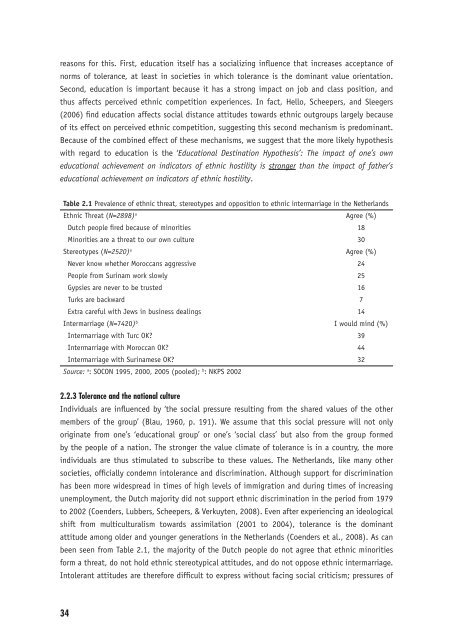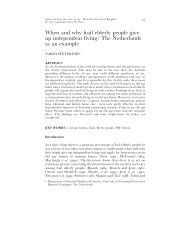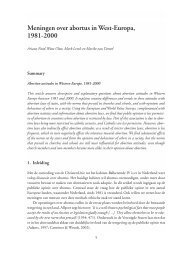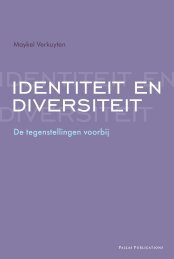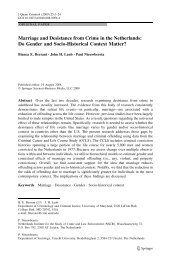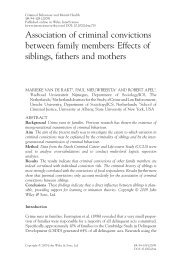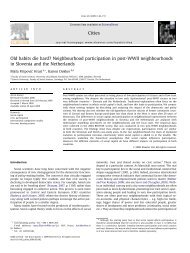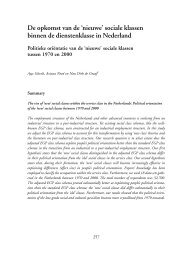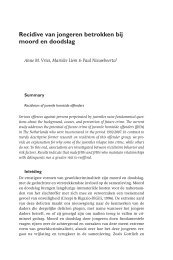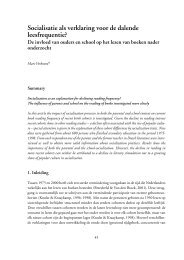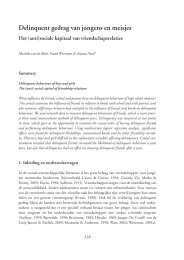Ethnic Hostility among Ethnic Majority and Minority Groups
Ethnic Hostility among Ethnic Majority and Minority Groups
Ethnic Hostility among Ethnic Majority and Minority Groups
You also want an ePaper? Increase the reach of your titles
YUMPU automatically turns print PDFs into web optimized ePapers that Google loves.
easons for this. First, education itself has a socializing infl uence that increases acceptance of<br />
norms of tolerance, at least in societies in which tolerance is the dominant value orientation.<br />
Second, education is important because it has a strong impact on job <strong>and</strong> class position, <strong>and</strong><br />
thus affects perceived ethnic competition experiences. In fact, Hello, Scheepers, <strong>and</strong> Sleegers<br />
(2006) fi nd education affects social distance attitudes towards ethnic outgroups largely because<br />
of its effect on perceived ethnic competition, suggesting this second mechanism is predominant.<br />
Because of the combined effect of these mechanisms, we suggest that the more likely hypothesis<br />
with regard to education is the ‘Educational Destination Hypothesis’: The impact of one’s own<br />
educational achievement on indicators of ethnic hostility is stronger than the impact of father’s<br />
educational achievement on indicators of ethnic hostility.<br />
Table 2.1 Prevalence of ethnic threat, stereotypes <strong>and</strong> opposition to ethnic intermarriage in the Netherl<strong>and</strong>s<br />
<strong>Ethnic</strong> Threat (N=2898) a Agree (%)<br />
Dutch people fi red because of minorities 18<br />
Minorities are a threat to our own culture 30<br />
Stereotypes (N=2520) a Agree (%)<br />
Never know whether Moroccans aggressive 24<br />
People from Surinam work slowly 25<br />
Gypsies are never to be trusted 16<br />
Turks are backward 7<br />
Extra careful with Jews in business dealings 14<br />
Intermarriage (N=7420) b I would mind (%)<br />
Intermarriage with Turc OK? 39<br />
Intermarriage with Moroccan OK? 44<br />
Intermarriage with Surinamese OK?<br />
Source:<br />
32<br />
a : SOCON 1995, 2000, 2005 (pooled); b : NKPS 2002<br />
2.2.3 Tolerance <strong>and</strong> the national culture<br />
Individuals are infl uenced by ‘the social pressure resulting from the shared values of the other<br />
members of the group’ (Blau, 1960, p. 191). We assume that this social pressure will not only<br />
originate from one’s ‘educational group’ or one’s ‘social class’ but also from the group formed<br />
by the people of a nation. The stronger the value climate of tolerance is in a country, the more<br />
individuals are thus stimulated to subscribe to these values. The Netherl<strong>and</strong>s, like many other<br />
societies, offi cially condemn intolerance <strong>and</strong> discrimination. Although support for discrimination<br />
has been more widespread in times of high levels of immigration <strong>and</strong> during times of increasing<br />
unemployment, the Dutch majority did not support ethnic discrimination in the period from 1979<br />
to 2002 (Coenders, Lubbers, Scheepers, & Verkuyten, 2008). Even after experiencing an ideological<br />
shift from multiculturalism towards assimilation (2001 to 2004), tolerance is the dominant<br />
attitude <strong>among</strong> older <strong>and</strong> younger generations in the Netherl<strong>and</strong>s (Coenders et al., 2008). As can<br />
been seen from Table 2.1, the majority of the Dutch people do not agree that ethnic minorities<br />
form a threat, do not hold ethnic stereotypical attitudes, <strong>and</strong> do not oppose ethnic intermarriage.<br />
Intolerant attitudes are therefore diffi cult to express without facing social criticism; pressures of<br />
34


